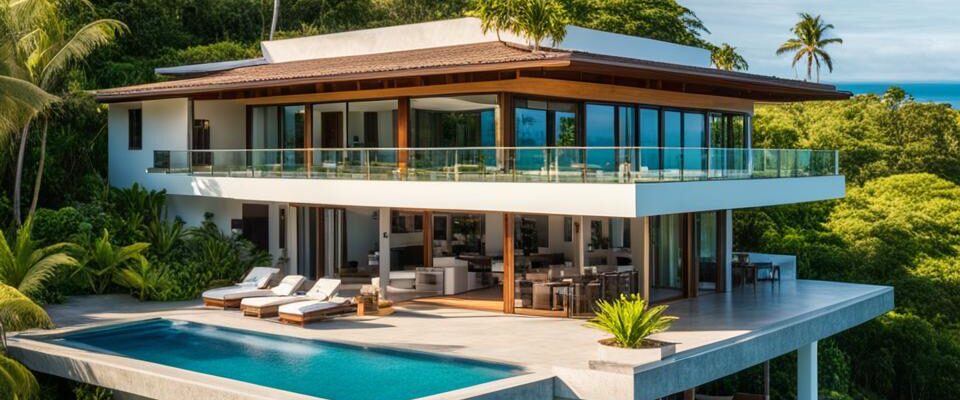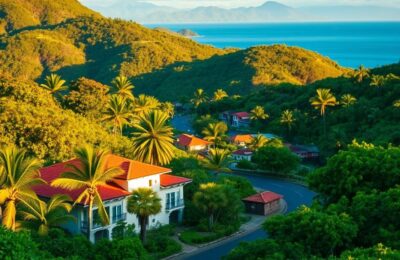About Costa Rica Real Estate Laws for Foreigners
Thinking of buying property in Costa Rica’s stunning landscapes? With the market picking up, it’s key for outsiders to learn about buying property. This includes ownership laws, taxes, research needs, and legal issues. This complete guide introduces vital aspects of buying residential or commercial real estate there as a foreigner.
Key Takeaways
- Foreigners have the same property rights as locals, except for certain lands owned by the government.
- Before buying, it’s important to confirm property titles, check zoning laws, and look for any encumbrances.
- Property taxes in Costa Rica are between 0.25% to 1.5% of the property’s value. Many locals undervalue their properties significantly.
- Plan for 5-6% of the property’s sale price for closing costs.
- It’s a good idea to work with a trusted local real estate attorney when purchasing in Costa Rica.
Can Foreigners Buy and Own Property in Costa Rica?
Foreigners and Costa Rican citizens have the same rights when buying property. Non-residents can buy property in Costa Rica without needing to be residents or citizens. Most properties have easy-to-understand titles, just like in the U.S. and Canada. There are no limits on owning land in Costa Rica if you’re not from there.
Equal Rights for Foreigners and Citizens
In Costa Rica, both foreigners and citizens can freely buy property. It doesn’t matter where you’re from. Everyone enjoys the same rights when buying land or houses in Costa Rica.
Ownership Without Residency or Citizenship
Foreigners can buy property without becoming a resident or citizen of Costa Rica. This freedom encourages investment in Costa Rica. It’s ideal for those looking for a second home, rental, or investment.
Fee Simple Titles
Most properties in Costa Rica use fee simple titles, a common system in the U.S. and Canada. This title gives the full rights of ownership to the owner. It’s a secure way for foreigners to own property.
Gap Real Estate has over 20 years of experience in Costa Rica. We offer top-notch service for your real estate needs. Reach out to us at WhatsApp +506 4001-6413 or info@gap.cr. Discover great property ownership chances in this stunning Central American spot.
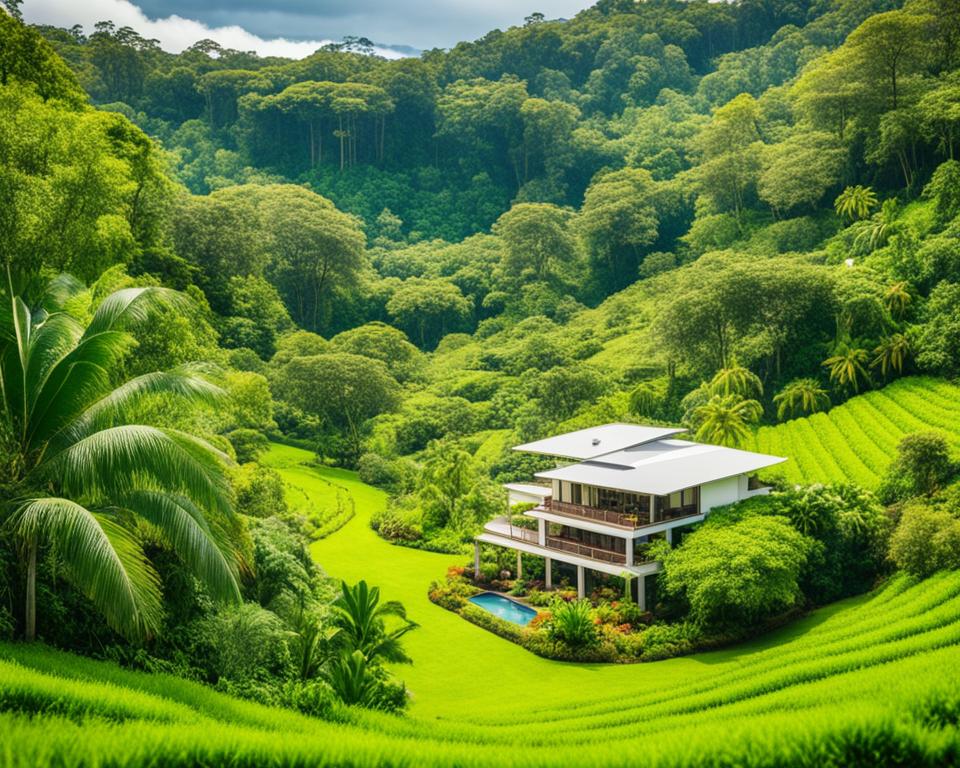
General Information on Property Ownership
In Costa Rica, both locals and foreign citizens have the same land rights. This is unless the land was sold through a government plan. In such cases, the land can only be traded or sold to foreigners later on. But there’s an important note: foreigners do not have to live in Costa Rica to own property there.
Equal Rights for Foreigners and Citizens
Costa Rica treats both locals and foreigners equally in property ownership. Laws give the rights of buying and owning land to all. This is big news for foreigners wanting to invest in Costa Rican real estate. They have the same legal cover as local buyers.
Exceptions for Government Programs
But, properties bought through government schemes have a different rule. In these cases, the land can only go to a fellow foreigner later. This is after the present owner has had it for a defined period. This period is set by specific regulations.
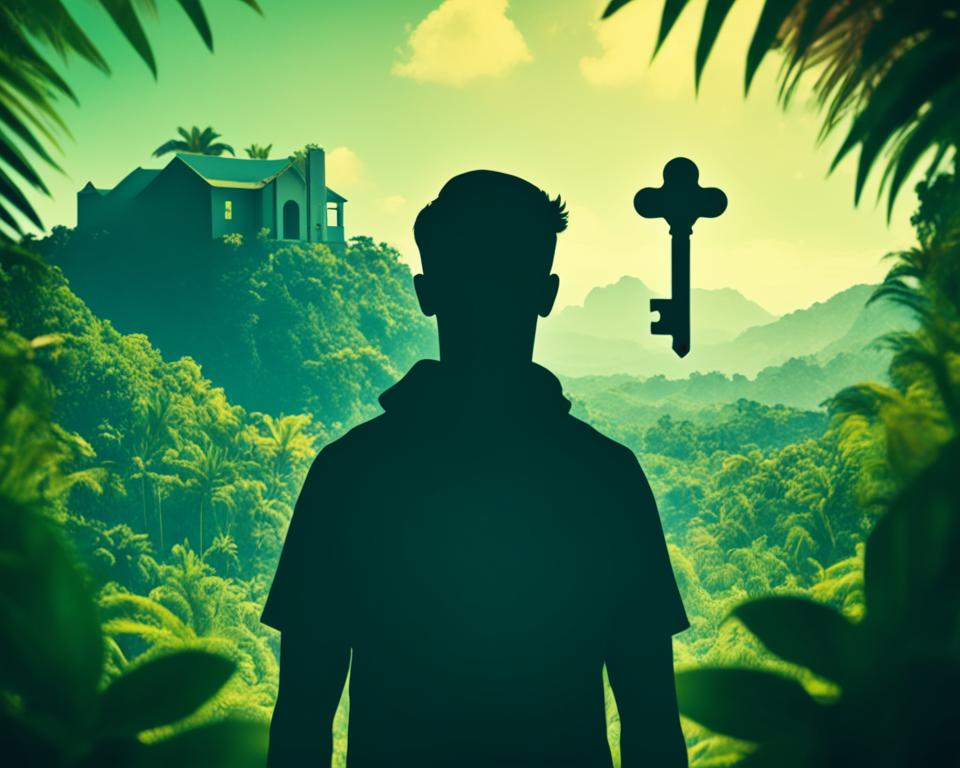
Property Registration and Title Search
Buying real estate in Costa Rica means learning about its property registration system. In Costa Rica, all properties are listed at the National Registry. This includes info on who owns it, any debts (liens), and mortgages. It’s vital to check a property’s title and ownership before you buy it.
Costa Rican Property Registry
The National Registry is where all property records are kept in Costa Rica. It holds important details about a property. This includes who owns it, if there are debts, and any ongoing legal issues. Checking these records with a title search is key.
Verifying Title and Ownership
For a safe property purchase, do a thorough title search in Costa Rica first. This will confirm the ownership status. And it makes sure there are no hidden debts (liens or encumbrances). The goal is to prevent any problems with the ownership transfer.
Registering New Ownership
After buying a property, it must be officially registered with the National Registry. This process usually takes two weeks. Then, the new owner gets an official title. It’s a key step for the legal rights to the property.
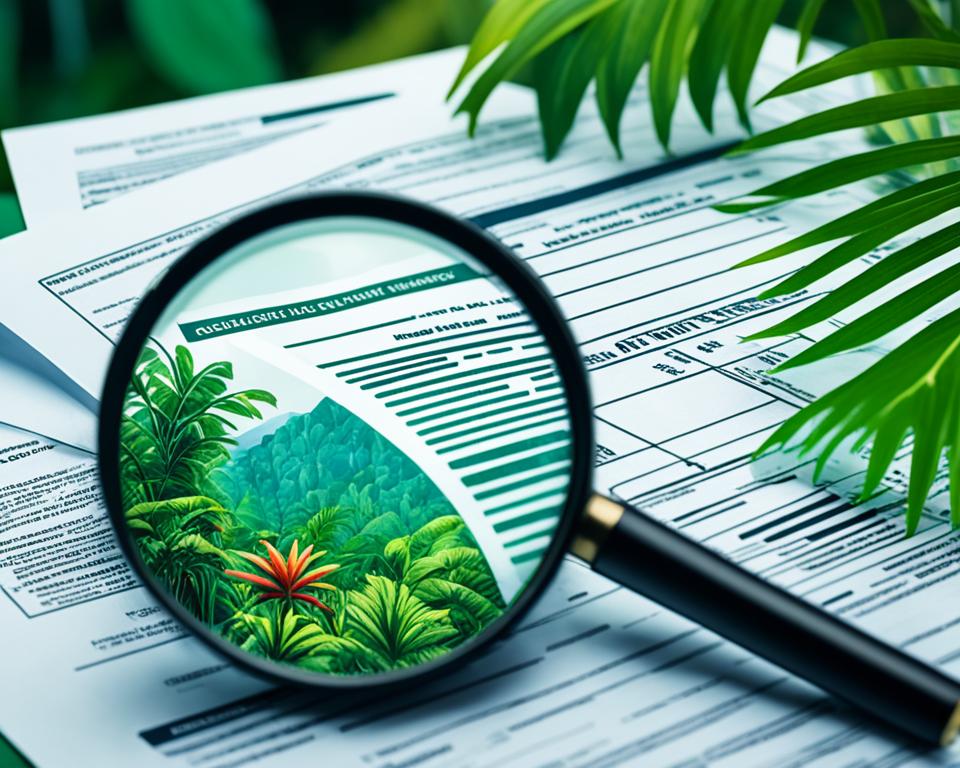
Zoning Laws and Regulations
In Costa Rica, zoning laws and regulations are very strict. Development and construction projects face a tough review. This review is by several government bodies. It includes the Ministerio de Salud (Health Department), the Instituto de Vivienda y Urbanismo (INVU) Housing and Urban Development Institute, and the Costa Rican Tourism Institute.
Building and Subdivision Plan Approvals
To start a construction project, owners must first get their plans approved. These plans need to follow the costa rica zoning laws and other rules. The approval process takes time, sometimes several months. So, planning ahead is key for any property project in Costa Rica.
Zoning Plan Submission and Approval
Developers also need to share a zoning plan for their project. This plan describes what the land will be used for, its structures, and needed infrastructure. Before any building permits costa rica are given, this plan must be okayed by the INVU and the local government. These steps are to make sure the costa rican real estate market grows sustainably.
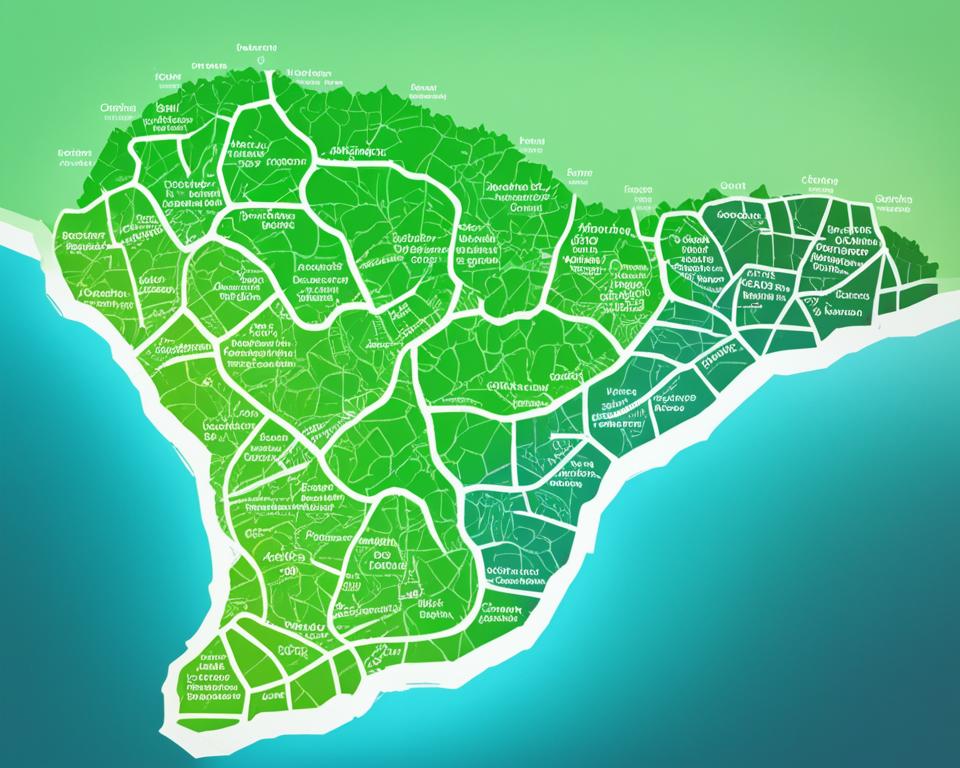
Property Taxes and Closing Costs
When you buy real estate in Costa Rica, it’s key to know about property taxes and closing expenses. Costa Rica has a property tax range of 0.25% to 1.5%. Most owners undervalue their properties by about 20% during registration. This reduces the property taxes they pay.
Property Tax Rates
In Costa Rica, property tax rates are often seen as very low, especially compared to other places. Still, it’s vital for buyers to consider these taxes in their investment calculations.
Undervaluation of Properties
Many property owners in Costa Rica purposely undervalue their properties when registering. They do this to lower the property taxes they must pay. This is legal but might affect the property’s true market value. Buyers should keep this in mind.
Closing Costs and Fees
Buyers in Costa Rica should also know about the closing costs. These typically add up to 5-6% of the property’s sale price. They include transfer taxes, stamp taxes, and legal fees. Usually, the buyer covers these costs. But sometimes, both parties might share the costs.
| Closing Cost Category | Approximate Cost |
|---|---|
| Transfer Tax (1.5% of property value) | $4,500 |
| National Registry & Documentary Stamps | $3,900 |
| Legal Fees (1.25-1.5% of property value) | $3,750 |
| Value-Added Tax (IVA) on Legal Fees | $488 |
| Total Closing Costs (approx.) | $10,639 |
It’s crucial for foreigners buying real estate in Costa Rica to understand property taxes and closing costs. Knowing about these financial obligations helps buyers make better and more informed choices during the buying process.
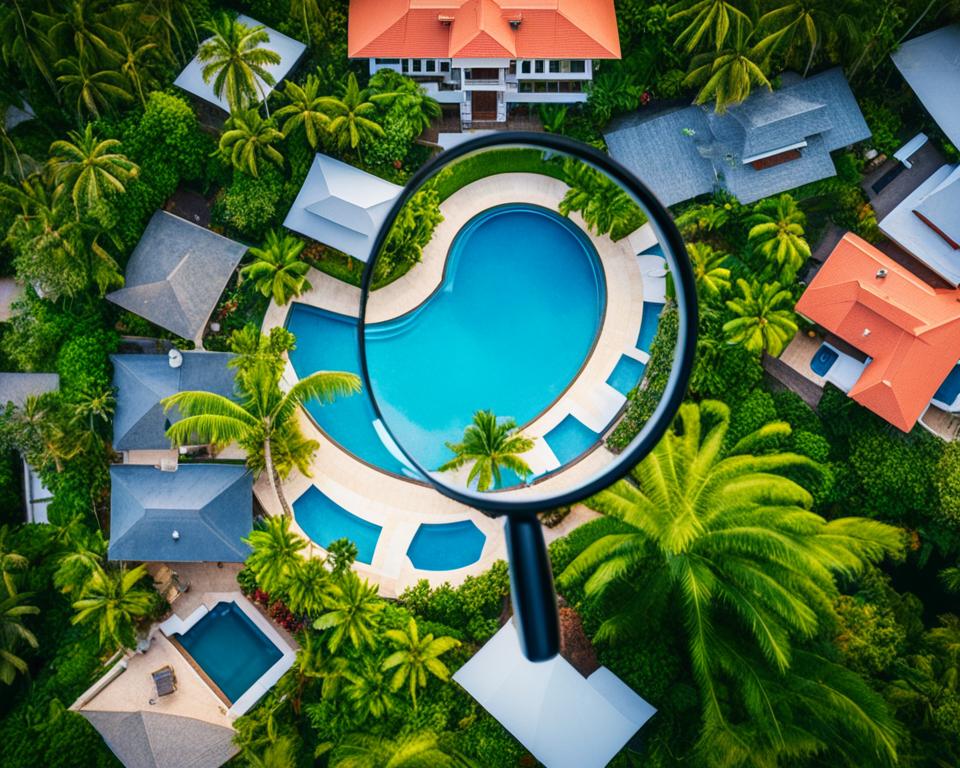
about Costa Rica Real Estate Laws
Costa Rica has specific laws for owning and buying real estate. These apply to citizens and foreigners. It’s important to know these laws if you’re thinking of buying property there. This article will outline the main legal points for foreigners buying real estate in Costa Rica.
The National Registry in Costa Rica is key. It keeps official records of who owns what. This is important for checking property titles and any legal issues. Costa Rica’s legal system helps protect real estate investors. It offers ways to solve disputes and legal help if needed.
Foreigners can buy most types of property in Costa Rica. But, there are some limits. For example, special rules affect land near the sea and borders. The Maritime Zone Law covers the first 200 meters of coastal land. It’s split into Public and Restricted Zones.
Building in the Restricted Zone means getting a 20-year concession. You must follow certain rules and get local approval. If foreigners want to build near the coast, they must follow specific rules. This might involve residency or setting up a local corporation.
| Types of Land Ownership | Regulations | Key Considerations |
|---|---|---|
| Private Property | Owned by individuals or corporations, the most common type for foreign investors. | Few restrictions on foreign ownership. |
| Public Property | The first 50 meters from the high tide line are public land. | Development is highly restricted in this area. |
| Concession Property | The Restricted Zone can be developed through 20-year concessions with approval from local authorities. | Specific residency and ownership requirements for foreigners. |
While hiring a local Real Estate attorney isn’t required, it’s wise. It can make the buying process smoother. They help with checking the property, preparing contracts, and advising on taxes. This is part of the due diligence process in Costa Rica.
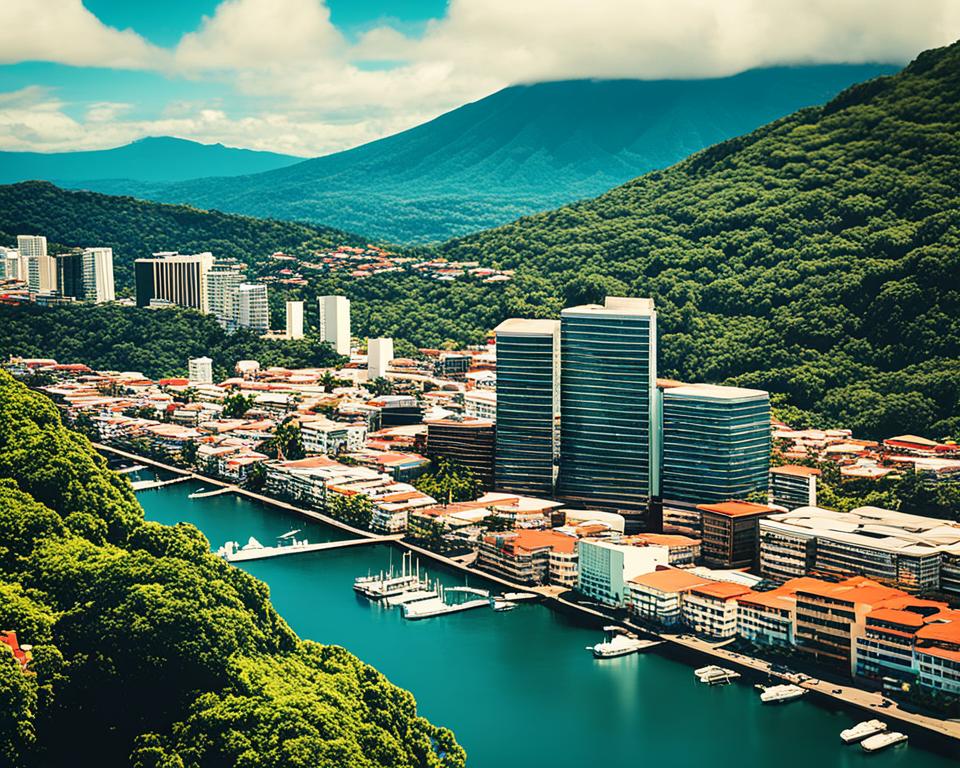
Gap Real Estate has over 20 years of experience in Costa Rica. We’re here to give you top-notch service for buying real estate. Contact us at WhatsApp +506 4001-6413 or info@gap.cr.
Ocean Front and Coastal Properties
Understanding Costa Rica’s coastal property rules is key for investors. The country has strong laws to balance access, protecting the environment, and private rights. This makes getting beachfront or ocean-view property different.
Public Beach Access Laws
Law in Costa Rica says the first 50 meters above the high tide line are the Public Zone. The government owns this land except for situations allowing private ownership. Then, there’s the Restricted Zone, the next 150 meters. It’s also government-owned but can be used by private people with a permit from the local Municipality for 5 to 20 years.
Maritime Zone Regulations
The first 200 meters from the ocean are the Maritime Zone. The first 50 meters are always public. You can’t own this or build on it without government approval. To build on the next 150 meters, you need a special permit that takes time. Foreigners need to be residents for 5 years to get this permit.
Development in the Maritime Zone is tough except for some cases, like certain old properties and places for the public or tourism. If you own property by the coast, you pay a tax every year. This could be as much as 4% of the land’s value, plus 0.25% for buildings. The cost for beachfront property taxes changes. But for homes, you might pay anywhere from $1,500 to $25,000 a year.
To buy property near the ocean in Costa Rica, knowing the rules is a must. Most beachfront land is not for sale but given as a temporary right. It’s very important to do your homework and get help from experts in the field.

Owning Property Through Corporations
Many foreigners buying real estate in Costa Rica do so through a company. They use entities like Sociedad Anónima (S.A.) or Sociedad de Responsabilidad Limitada (S.R.L.). This choice can make estate planning, tax management, and protecting assets easier. It also offers access to local bank services.
Advantages of Corporate Ownership
Owning property through a corporation offers possible tax breaks in Costa Rica. Corporate set-ups could get tax incentives, exemptions, or lower rates, based on rules and circumstances. This makes it a smart choice for foreign investors aiming to grow their money.
Due Diligence for Corporate Ownership
Buying Costa Rican property through a company needs careful checking. Ensure there are no debts or issues linked to the property or the company itself. Talking to legal experts familiar with local real estate and corporate laws is wise. They can guide and help follow all regulations correctly.
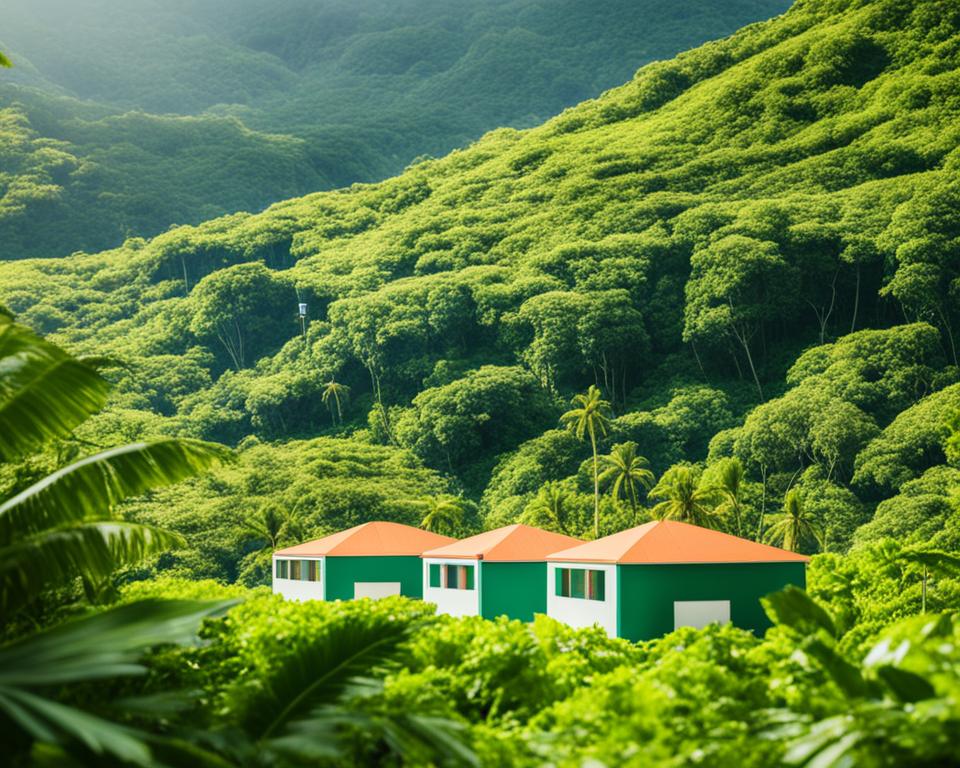
Finding the Right Real Estate Agent
Buying property in Costa Rica requires a trustworthy real estate agent. The agent should be registered with SUGEF. This means they follow high financial standards and have a history of successful deals. They will also suggest using escrow services to keep your money safe.
Experience and Reputation
Experience really matters in real estate agents in Costa Rica. Agents who’ve worked here for a long time understand the market well. They know about prices and trends. It’s also smart to check what others say about the agent online. This can show if they’re really good at what they do.
SUGEF Registration
In 2020, the Costa Rican government gave SUGEF more power to watch over real estate agencies. This is to stop troubles like money laundering. Making sure your agent is SUGEF-registered adds more trust to the buying process.
Use of Escrow Services
When you buy in Costa Rica, a good real estate agent will talk to you about using escrow. Escrow makes sure that the buying process is safe for you and the seller. It’s a way to have a worry-free real estate transaction.
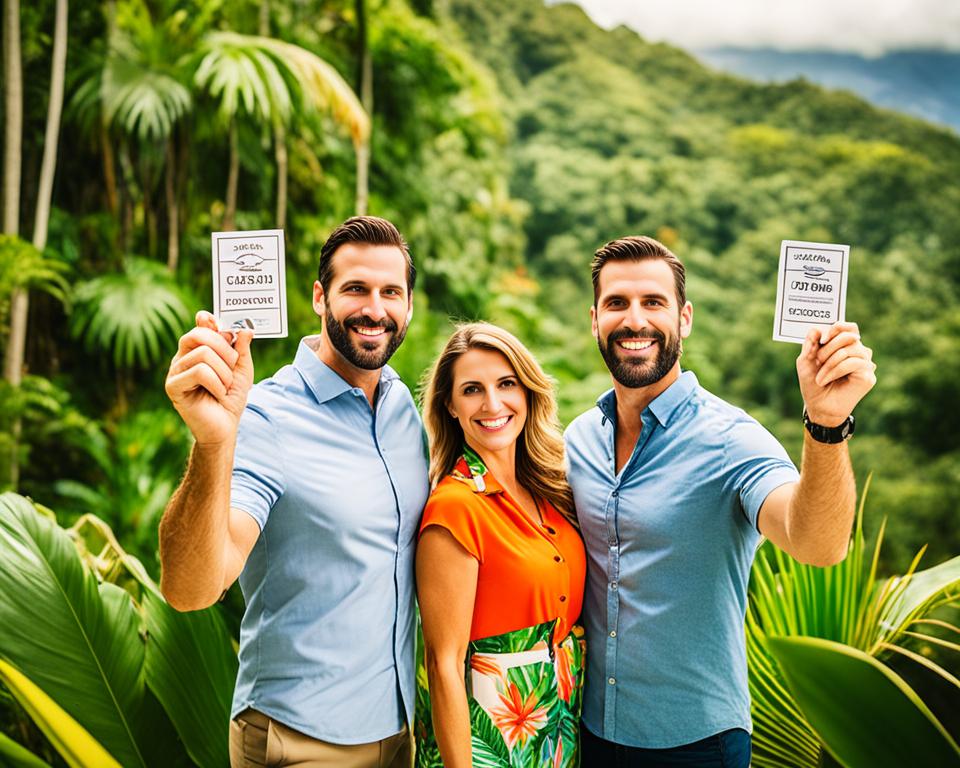
Hiring a Real Estate Attorney
When you buy property in Costa Rica, hiring a costa rican real estate lawyer is key. This lawyer needs to also be a notary. They check the property’s title, suggest the best way to own it (as an individual or a company), and manage the purchase process. Working with a real estate transactions costa rica expert, who speaks your language, helps make buying the property go smoothly.
Importance of a Reputable Lawyer
Real estate deals in Costa Rica come with legal challenges. It’s critical to have a skilled and honest lawyer with you. A good lawyer makes sure you understand and meet all local laws and rules. This way, you can buy your property without worry.
Advising on Ownership Structure
Your lawyer will guide you on how to own the property – personally or through a business. This choice is important for taxes, managing the property after you die, and legal matters.
The Purchase Process in Costa Rica
Buying property in Costa Rica is easier with the right help. When you make an offer on a place, a real estate attorney makes a legal agreement. This agreement explains everything about the deal, making sure it goes smoothly.
Offer and Purchase Agreement
This agreement talks about the price, when it’s closing time, and some special terms. It’s a legal agreement that guides the next steps of buying in Costa Rica.
Deposits and Escrow
After agreeing to buy, you’re asked to put down a deposit in Costa Rica. This is usually about 10% of the home’s price. It’s put in a special account until everything is final, protecting both the buyer and seller. This fund also covers some closing costs.
Closing and Transfer
The actual closing can happen between 30 to 60 days after signing. At this time, the attorney finishes the paperwork and makes sure the ownership change is recorded. After closing, you own the property.
Gap Real Estate has over two decades of experience across Costa Rica. We’re ready to offer you top-notch service for your next buy. To get started, reach out on WhatsApp at +506 4001-6413 or send us an email at info@gap.cr. We can help you with the entire buying process.
Title Insurance and Surveys
Buying real estate in Costa Rica? Consider getting title insurance. It protects you from problems like invalid documents or hidden heirs. Even though Costa Rica has a good property title registry, title insurance is extra security for those buying from abroad.
Importance of Title Insurance
In Costa Rica, the property registry is strong. But, title insurance is still vital. American buyers often choose this for more peace of mind. It reduces risks and ensures a safe transaction.
Surveying Requirements
When you buy property in Costa Rica, you also need a property survey. If there isn’t a recent one, you must get a new survey done before closing the sale. This survey defines the property’s boundaries clearly. It makes sure the ownership transfer is accurate and legal.
Financing Options for Real Estate
Buying real estate in Costa Rica offers a range of financing choices. These include deals from local banks, mortgage brokers, and even owner financing. It’s key to look into these to find the best for your investment in Costa Rica.
Local Banks and Mortgage Brokers
Costa Rica has many banks that give out loans for homes and businesses. They usually offer loans in U.S. dollars with interest rates between 7-10%. For loans in Costa Rican colones, interest rates can go up to 20%. Some brokers help connect buyers to these banks, making the loan process easier.
Alternative Financing Sources
If you don’t want a loan from a bank, there are other ways to get the money. You might consider using the equity in your home in North America. This can help you buy a home in Costa Rica. Another option is using IRAs to invest in Costa Rica, which is good for income but not for living. Also, some sellers might offer to finance part of the purchase, but the terms can vary a lot.
No matter which way you choose to finance your purchase, picking reputable partners is crucial. With more than 20 years of experience, Gap Real Estate can help you understand your options. They make sure you’re making a smart choice for your investment.
Residency and Visa Requirements
Foreigners don’t need costa rica real estate residency or citizenship to buy property in costa rica. But, they might need a special visa depending on where they’re from and how they plan to use the property. It’s smart to talk to an immigration lawyer about the right visa for you.
In the past, getting a visa to live in costa rica through real estate needed a $200,000 investment. Now, that amount is less, just $150,000. This change means it’s easier for people outside costa rica to invest in property there.
| Residency Type | Requirements |
|---|---|
| Investor (Inversionista) | Requires a real estate investment of $150,000 or more. This gives a two-year residency that can be renewed. After three years, you can get permanent residency. Your spouse and kids can come too. |
| Retiree/Pensioner (Pensionado) | Need a lifetime pension of $1,000 a month for residency. This covers the main person and their spouse or kids. |
| Rentor/Fixed Income (Rentista) | Need to show an income of $2,500 a month for a residency visa. It can be renewed and after three years upgraded to permanent residency. |
| Residency via a First-Degree Relationship with a Costa Rican | Spouses of Costa Ricans can get temporary residency that you can renew yearly. After three years, you can get permanent residency. Parents of Costa Ricans can have it too. |
Knowing about the different costa rica real estate residency options is crucial. This helps investors from other countries feel sure when buying property in Costa Rica. Plus, it keeps them on the right side of the law.
Real Estate Investment Opportunities
Costa Rica is a great place for real estate investments. It has everything from vacation rental properties to commercial real estate and development land. The country’s strong economy, beautiful landscapes, and growing tourism make it a top pick for real estate investors.
Vacation Rentals
The beautiful beaches, rainforests, and eco-tourism spots in Costa Rica bring in many visitors. This creates a big demand for vacation rental homes. Buying beachfront villas or mountain getaways can be a smart move. The stable politics and friendly rules for real estate also make this a great opportunity.
Commercial Properties
Costa Rica isn’t just for homes, it’s also a hotspot for commercial real estate. Its location is ideal for businesses aiming for the North American market. Think about investing in office spaces, retail, or hospitality to expand your real estate portfolio.
Development Land
Costa Rica is focused on sustained and eco-friendly growth. This makes it a perfect place for development land investors. You could develop eco communities, mixed projects, or green commercial spaces. It’s key to work with experts in these real estate investment opportunities.
When investing in Costa Rica, doing your homework and finding the right team is key. Work with knowledgeable agents and lawyers. This ensures your real estate ventures in this vibrant market go well.
Conclusion
Buying real estate in Costa Rica can be very rewarding for people from other countries. Yet, it’s key to know the laws and rules for owning property. It’s advised to team up with trusted real estate agents, lawyers, and experts. Doing so makes the whole buying process smooth. Then, you can relish your little paradise in Costa Rica.
Costa Rica is known for its strong economy, stunning natural sites, and a fast-growing tourism sector. This makes it a great spot for real estate investments for outsiders. You can choose from holiday homes to commercial spaces or land for development. But, be sure to check everything thoroughly and partner with skilled experts for any investment.
Getting to know the real estate laws in Costa Rica and rules for owning property here is crucial for foreign buyers. With the help of experts in the field, buying property in Costa Rica can be straightforward. This way, you can confidently buy your very own retreat in this beautiful tropical land.
FAQ
Can foreigners buy and own property in Costa Rica?
Are there any restrictions on foreign ownership of property in Costa Rica?
What type of property titles are common in Costa Rica?
Do foreigners need to live in Costa Rica to own property there?
How is property ownership registered in Costa Rica?
What are the requirements for constructing or subdividing property in Costa Rica?
What are the property tax rates and closing costs for real estate transactions in Costa Rica?
What are the laws and regulations governing coastal and beachfront properties in Costa Rica?
Can foreigners own property in Costa Rica through a corporation?
What should I look for when hiring a real estate agent in Costa Rica?
Source Links
- https://www.costarica.com/real-estate/real-estate-regulations
- https://www.nikorilifestyles.com/blog/understanding-property-laws-and-investment-regulations-in-costa-rica
- https://www.sausko.com/real-estate-blog/costa-ricas-real-estate-laws/
- https://www.hrgvacations.com/blog/costa-rica-real-estate/guide-buying-property-costa-rica-what-you-need-know
- https://www.tresamigos-cr.com/buying-property-costa-rica
- https://www.specialplacesofcostarica.com/blog/buying-property-in-costa-rica-frequently-asked-questions/
- https://crlaw.info/info/real-estate/real-estate-laws/
- https://ticotimes.net/2024/05/13/the-complexities-of-real-estate-ownership-in-costa-rica
- https://www.costaricaweb.com/business/cinderealestate.htm
- https://lawyersofcostarica.com/costa-rica-real-estate-law/
- https://crie.cr/costa-rica-property-laws/
- https://landcolaw.com/real-estate/costa-rica-closing-costs-how-theyre-calculated/
- https://bluewaterpropertiesofcostarica.com/blog/costa-rica-closing-costs-how-much-who-pays/
- https://www.livingcostarica.com/costa-rica-real-estate-topics/closing-costs-on-costa-rica-property-how-to-calculate-and-who-pays/
- https://www.langstonrealty.com/posts/what-are-the-rules-that-apply-to-owning-property-on-the-beachfront-in-costa-rica
- https://www.remax-oceansurf-cr.com/costa-rica-maritime-zone-concession-property
- https://www.livingcostarica.com/costa-rica-real-estate-topics/costa-rica-beachfront-property-restrictions/
- https://expat-tations.com/law/owning-property-under-your-name-or-corporation/
- https://bluewaterpropertiesofcostarica.com/blog/real-estate-in-costa-rica-corporation-sociedad/
- https://crgar.com/choosing-a-real-estate-agent-in-costa-rica-the-essential-information-you-should-know/
- https://flamingobeachrealty.com/how-to-find-a-real-estate-agent-in-costa-rica/
- https://www.gaprealestate.com/about-us/
- https://landcolaw.com/real-estate/costa-rica-homebuyers-guide-you-need-real-estate-attorney/
- https://pirielegal.com/real-estate-attorney-in-costa-rica/
- https://aglegal.com/commercial-law/hiring-a-lawyer-in-costa-rica/
- https://www.gaprealestate.com/list-my-property/
- https://aglegal.com/real-estate-law/buying-property-in-costa-rica/
- https://www.propertiesincostarica.com/buying_real_estate.htm
- https://www.gaprealestate.com/differences-between-open-and-exclusive-listings-in-real-estate/
- http://guidetocostaricarealestate.com/christopher-howards-guide-to-real-estate-in-costa-rica/christopher-howards-guide-to-real-estate-in-costa-rica/chapter-8-due-diligence/title-insurance
- https://osatropicalproperties.com/blog/your-2024-guide-to-buying-real-estate-in-costa-rica
- https://www.gaprealestate.com/understanding-open-listings-in-real-estate-in-costa-rica/
- https://bluewaterpropertiesofcostarica.com/blog/costa-rica-real-estate-financing-4-options/
- https://www.tresamigos-cr.com/financing-property-costa-rica
- https://bluewaterpropertiesofcostarica.com/blog/costa-rica-residency-homeowners-options-requirements-benefits/
- https://livingcostarica.com/costa-rica-real-estate-topics/buy-a-property-in-costa-rica-and-get-your-costa-rica-residency/
- https://landcolaw.com/real-estate/real-estate-market-in-costa-rica-at-landco-we-advise-you/
- https://ticotimes.net/2024/01/28/how-to-invest-in-real-estate-in-costa-rica-a-tax-perspective
- https://crie.cr/real-estate-investment-in-costa-rica/

